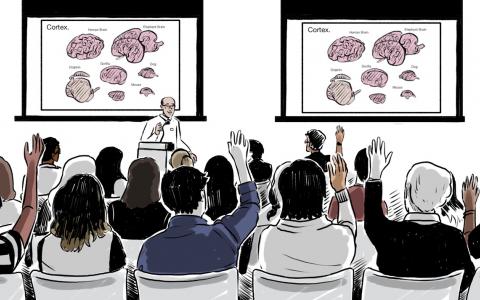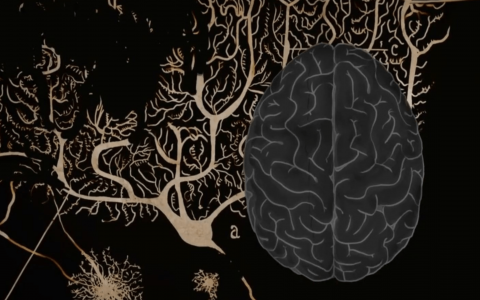
How do you define intelligence in the context of behaviour?
By April Cashin-Garbutt and Hyewon Kim
Research at the Sainsbury Wellcome Centre focuses on understanding the biology of intelligence by uncovering the neural algorithms supporting adaptive behaviour. But how is intelligence defined in the context of behaviour? We sat down with 13 leading neuroscientists following their seminars at SWC Seminar to find out their thoughts. Here are six takes.
1. Goal-directed behaviour
“To me, intelligence means optimising your interactions with the world around you to achieve a certain goal. It is relative – what is intelligent for a mouse to do is different from what is intelligent for a person to do.
If you think about intelligence as directing your behaviour toward a goal, the higher the goal, the more complex your behaviour is going to be. For example, if you are a social animal, you are not just thinking about yourself but you have to think about the group.” Teresa Guillamón Vivancos, Instituto de Neurociencias de Alicante
“Intelligence is a very difficult concept and many people have different definitions. This is an issue law deals with constantly in terms of the imprecision of language: what is the concept we’re fundamentally trying to talk about?
From my training as a behavioural scientist, I tend to think about goal-directed versus habitual behaviour. Intelligence is quite clearly demonstrated through goal-directed behaviour, which requires complex executive functioning and inhibitory control but also the maintenance of a goal-value and adaptation of a behavioural plan. I might think of systematic intelligence is the ability to efficiently use brain resources and switch between habitual and goal-directed behaviour.” Emily Murphy, University of California Hastings College of the Law
2. Flexible behaviour
“There is a certain kind of flexibility in using evidence for decision-making, but also in being flexible about how you use that intelligence, and having a hierarchy of inputs that drive decision.
There is a joke among neuroscientists that goes, ‘How many neurons does it take to make a decision? Zero.’ You have something like the single-celled protist Chlamydomonas that phototax towards the light. They don’t need any neurons to do that. And yet, they’re detecting gradients of light. That’s a decision.
What we call intelligence is not, for example, a cockroach that wants to go and eat something. The intelligent behaviour for a cockroach is that it really want to eat something, but sees that there is a person, so it overrides the desire to eat with the desire to avoid harm. That kind of intersection where there is a learning-dependent hierarchy of decisions that have to be made based on competing sensory inputs, is a key part of intelligence.” Alison Barth, Carnegie Mellon University
“Flexibility based on context and prior experience.” Michael Long, New York University
“A scientist would give a definition focused on flexibility, the combinatorial capabilities that are generative. This is what you see with language. You can take two elements, put them together, and create something new. I think that is part of intelligence, but there is also the component of flexibility – you're not locked into a specific pattern of behaviour, but it can change dynamically dependent on context.” Michael Platt, University of Pennsylvania
3. Generalising to a new context
“Maybe intelligence is the understanding of structure and knowledge that generalises to a new context. Behaviour is our only readout of internal mental state and we can’t read out anything, including intelligence, without behaviour.” Ilana Witten, Princeton University
“I think intelligence is the ability to generalise previous experiences to make predictions in novel scenarios. That to me is intelligent behaviour.” Andrew Alexander, Boston University
“I often think about intelligent behaviour in terms of memory, so effectively using past experience to make sensible behavioural choices. Integrating what you know and making predictions about what you know, to figure out what to do next in a way that a simple stimulus response would not give you.” Loren Frank, University of California, San Francisco (UCSF)
4. Adaptive behaviour
“What intelligence means for each species has to be different. Intelligence defines the dimension along which individuals of a given species vary in their ability to perform the behaviours that are required in their niche. If we can understand the transformation of this scale across species (or computers?!), this might take us towards a more general definition of intelligence.” Julia Harris, The Francis Crick Institute
“I think all animals are intelligent. I don’t think of behaviours as intelligent or not intelligent, I think of them as adapted for a particular purpose. Every animal behaves in a particular way because it has evolved over millions of years of evolution for a particular niche in its environment to perform a particular thing. Something that one animal is good at another animal might not be, not because it’s dumb but because that is not its evolutionary adaptation.
As a biologist, I don’t like to think about intelligence, I like to think about adaptation. Very often, we, as humans, have defined intelligence as something that is similar to humans. If an animal’s behaviour has similarities to what a human does, it is intelligent; if it doesn’t, it’s not intelligent. I think that’s just the wrong way to think about biology.
Animals don’t do some things that we do, not because they’re stupid, but because they’ve adapted to different environments. The evolutionary pressures that were put on us humans are very different to the evolutionary pressures that have been put on other animals, but we are equally intelligent because we are equally good at survival.” Dmitriy Aronov, Columbia University
5. Creative behaviour
“The more you work with mice you realise your definition of intelligence is quite abstract and biased. For me, creativeness is definitely a type of intelligence that we see across the animal kingdom. For example, in my work with mice, they often find a way to do something in a task that I haven’t even imagined!” Lina Marcela Carmona, Columbia University
6. Many different elements!
“I think it’s a very tricky question. One of the things that you notice when running experiments with different species of animal and with humans is that the timescales over which they integrate information and prospectively consider information can be very different.
As humans, we can consider things that occur over huge timescales. For example, when I got my undergraduate degree, I could reflect back and say, ‘it was right to choose maths as a 15-year-old.’ So one aspect of intelligence may be how well animals can put life events together to try and make links between disparate events.
Another element of intelligence is the way in which we use information to construct elaborate models of the world, which we can then effortlessly generalise to new situations.
This highlights the benefits of language. It is so obvious that perhaps we don’t mention it enough. We often spend weeks training our animals to perform a task, whereas in most human experiments, you can give them an information sheet and within a few minutes they can know exactly what you want them to do. The way in which we are able to use language to build models and also impart models to other people is an incredible skill.” Mark Walton, University of Oxford
“I think people describe it differently and it’s hard to be precise. You could say flexibility, ability to adapt and learn, make predictions – all these aspects are some facets of intelligence. You could say camouflage looks like an extremely intelligent behaviour, but it need not be. It’s not a reflex, it’s clearly adaptive and complex in its execution. But, whether that represents a facet of intelligence or not, I don’t know. I would say probably not. It’s a very rare and beautifully adaptive behaviour, but not necessarily intelligent in the sense that we usually understand when we talk about intelligence.
I think it’s also about the ability of one organism to predict something about the outside world and other conspecifics or non-conspecifics – there are many different levels going up to having an internal model of another person or individual.” Gilles Laurent, Max Planck Institute for Brain Research

